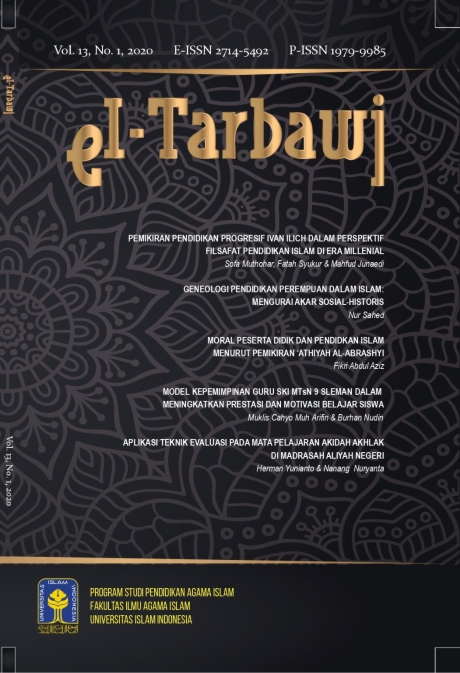Main Article Content
Abstract
Basically, the real purpose of Islamic education is to produce moral students. The problem is that in Islamic Education there are still many moral deviations committed by people of various backgrounds and ages in Indonesia. Islamic education has not fully led to moral education. The purpose of this study was to determine the biography and thoughts of 'Athiyah al-Abrashyi in education, and the concept of moral education for students. This research method is library research. The results of this study indicate that the educational basis of 'Athiyah Al-Abrasyi brings the concept of a learning process that leads students to become adult humans. To achieve the true goal of Islamic education, 'Athiyah al-Abrashyi offers a concept of educational thought that can be used as a reference for education in Indonesia today.
Keywords
Article Details
Copyright (c) 2021 EL TARBAWI

This work is licensed under a Creative Commons Attribution-ShareAlike 4.0 International License.
Authors retain copyright and grant the journal right of first publication with the work simultaneously licensed under a Creative Commons Attribution (CC-BY-SA) 4.0 License that allows others to share the work with an acknowledgment of the work’s authorship and initial publication in this journal.
References
- Al-Abrasyi, M. A. (1970). Dasar Pendidikan Islam (Terjemahan). Bulan Bintang.
- Anas Adi, I. (2018). Analisis Kritis Pemikiran Pendidikan Progresif Muhammad ‘Athiyah Al-Abrasyi (Prespektif Filsafat Pendidikan Islam). Inspirasi, 1(3).
- Arifin, Z. (2012). Pengembangan Manajemen Mutu Kurikulum Pendidikan Islam. Diva Press.
- ‘Athiyah al-Abrasyi, M. (1975). At-tarbiyah al-Islamiyahwa Fafasifatuha. Isa al-Babi al-Halabi.
- ‘Athiyah Al-Abrasyi, M. (1996). Beberapa Pemikiran Pendidikan Islam (Terjemahan). Titian Ilahi Press.
- Djuwaeli, I. (1998). Pembaruan Kembali Pendidikan Islam. Karsa Utama Mandiri dan PB. Mathlo’ul Anwar.
- Hamruni. (2008). Startegi dan Model-model Pembelajaran Aktif. Fakultas Tarbiyah UIN Sunan Kalijaga.
- Langgulung, H. (1991). Kreatifitas dan Pendidikan Islam: Analisis Psikologi dan Falsafah. Pustaka Al-Husna.
- Mustaqim. (2001). Psikologi Pendidikan. Pustaka Pelajar.
- Musyarofah. (2017). Metode Pendidikan Akhlak Menurut imam Ghozali. UIN Maulana Malik Ibrahim.
- P Daeng Sari, D. (1996). Metode Mengajar di Taman Kanak-Kanak. Departemen Pendidikan dan Kebudayaan.
- Pembelajaran Langsung dan Tidak Langsung. (n.d.). Retrieved April 4, 2019, from https://onopirododo.wordpress.com/2013/10/24/pembelajaran-langsung-dan-tidak-langsung/
- Rasyidin, A. (2012). Falsafah pendidikan Islami: Membangun Kerangka Ontologi, Epistimologi, Aksiologi Praktik Pendidikan. Cipta Pustaka Media Perintis.
- Samani, M. dan H. (2011). Konsep dan Pendidikan Karakter. Remaja Rosdakarya.
- Sujarwo. (2010). Peran Guru Dalam Pendidikan Nilai Pada Anak. Dinamika Pendidikan, 2(1).
- Syaodih, N. (2009). Metode Penelitian Pendidikan. Remaja Rosdakarya.
References
Al-Abrasyi, M. A. (1970). Dasar Pendidikan Islam (Terjemahan). Bulan Bintang.
Anas Adi, I. (2018). Analisis Kritis Pemikiran Pendidikan Progresif Muhammad ‘Athiyah Al-Abrasyi (Prespektif Filsafat Pendidikan Islam). Inspirasi, 1(3).
Arifin, Z. (2012). Pengembangan Manajemen Mutu Kurikulum Pendidikan Islam. Diva Press.
‘Athiyah al-Abrasyi, M. (1975). At-tarbiyah al-Islamiyahwa Fafasifatuha. Isa al-Babi al-Halabi.
‘Athiyah Al-Abrasyi, M. (1996). Beberapa Pemikiran Pendidikan Islam (Terjemahan). Titian Ilahi Press.
Djuwaeli, I. (1998). Pembaruan Kembali Pendidikan Islam. Karsa Utama Mandiri dan PB. Mathlo’ul Anwar.
Hamruni. (2008). Startegi dan Model-model Pembelajaran Aktif. Fakultas Tarbiyah UIN Sunan Kalijaga.
Langgulung, H. (1991). Kreatifitas dan Pendidikan Islam: Analisis Psikologi dan Falsafah. Pustaka Al-Husna.
Mustaqim. (2001). Psikologi Pendidikan. Pustaka Pelajar.
Musyarofah. (2017). Metode Pendidikan Akhlak Menurut imam Ghozali. UIN Maulana Malik Ibrahim.
P Daeng Sari, D. (1996). Metode Mengajar di Taman Kanak-Kanak. Departemen Pendidikan dan Kebudayaan.
Pembelajaran Langsung dan Tidak Langsung. (n.d.). Retrieved April 4, 2019, from https://onopirododo.wordpress.com/2013/10/24/pembelajaran-langsung-dan-tidak-langsung/
Rasyidin, A. (2012). Falsafah pendidikan Islami: Membangun Kerangka Ontologi, Epistimologi, Aksiologi Praktik Pendidikan. Cipta Pustaka Media Perintis.
Samani, M. dan H. (2011). Konsep dan Pendidikan Karakter. Remaja Rosdakarya.
Sujarwo. (2010). Peran Guru Dalam Pendidikan Nilai Pada Anak. Dinamika Pendidikan, 2(1).
Syaodih, N. (2009). Metode Penelitian Pendidikan. Remaja Rosdakarya.
